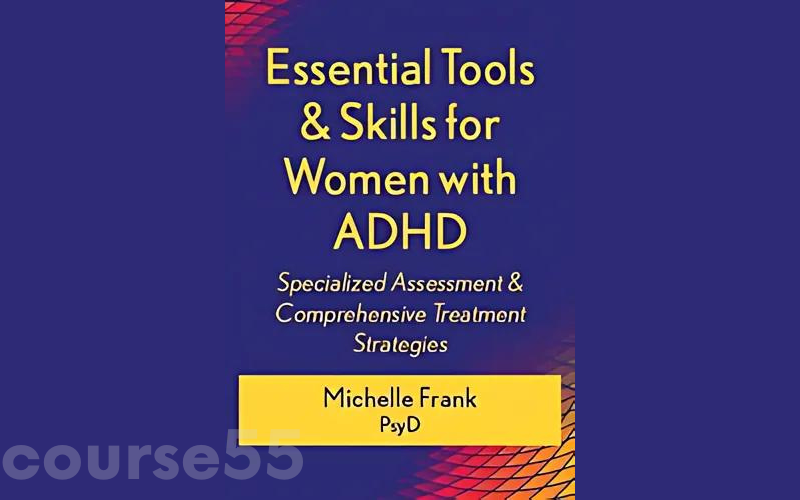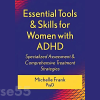Essential Tools & Skills for Women with ADHD: Specialized Assessment & Comprehensive Treatment Strategies By Michelle Frank – PESI
$199.00 Original price was: $199.00.$46.00Current price is: $46.00.
Essential tools & skills for women with ADHD: specialized assessment & comprehensive treatment strategies
Content Proof:
Understanding the complexities of Attention Deficit Hyperactivity Disorder (ADHD) in women is paramount, especially when societal pressures and hormonal factors come into play. “Essential tools & skills for women with ADHD: specialized assessment & comprehensive treatment strategies,” spearheaded by Dr. Michelle Frank, offers a thorough exploration of these nuances through a comprehensive training program rich in audio and video components. This 4-hour, 11-minute digital course delves into critical aspects such as the presentation of ADHD in women, common comorbid conditions, and the emotional ramifications of living with untreated ADHD. Dr. Frank’s work stands out as a beacon of hope for mental health professionals seeking to better understand and support their female clients through insightful treatment strategies and assessments.
The Unique Presentation of ADHD in Women
ADHD is often viewed through a lens primarily shaped by male experiences, leading to underdiagnosis and misdiagnosis in women. The training highlights how symptoms may manifest differently in women, presenting a tapestry woven with emotional threads that sometimes go unnoticed. Women may exhibit heightened emotional responses, anxiety, and social struggles that complicate their ADHD symptoms further. For example, while a typical ADHD diagnosis might encompass hyperactivity or impulsive behaviors, women often struggle with inattention, disorganization, or a crumbling self-image due to societal expectations.
Dr. Frank emphasizes the importance of recognizing these unique presentations. By doing so, mental health professionals can shift their diagnostic criteria, ensuring a more comprehensive understanding of their clients. It’s akin to viewing a rich painting through a narrow lens; only by stepping back can one appreciate the intricate details that tell a fuller story.
Moreover, societal norms play an influential role in how ADHD symptoms manifest and are perceived. Women often inherit a societal script that demands they juggle multiple responsibilities motherhood, career, and social obligations adding another layer of complexity to their experience. Research has consistently shown that societal expectations can exacerbate feelings of inadequacy, leading to feelings of shame or failure. Recognizing this interplay between ADHD and societal demands can lead to more nuanced treatment strategies that embrace these realities.
Comorbid Conditions: A Multifaceted Challenge
One of the pivotal discussions in this training revolves around the comorbid conditions frequently observed in women with ADHD. Conditions such as depression, anxiety, and eating disorders often coexist, further complicating the clinical picture. Dr. Frank’s program encourages practitioners to be vigilant in identifying these overlapping issues, as they may be most easily overlooked due to gender biases in traditional diagnostic methods.
Common Comorbid Conditions and Their Implications:
- Depression: Studies have found that women with ADHD are significantly more likely to experience depression, often stemming from the chronic stress and dysregulation that accompanies their ADHD symptoms.
- Anxiety: A pervasive issue, anxiety in women can amplify ADHD symptoms, creating a feedback loop that exacerbates emotional dysregulation and impaired concentration.
- Eating Disorders: Research indicates that the impulsivity often associated with ADHD can manifest in harmful eating patterns, contributing to disorders such as binge eating and anorexia.
Women with ADHD may wrestle with the weight of these additional conditions, leading to a compounded emotional legacy that takes a toll on their self-esteem and overall mental health. Dr. Frank’s program guides participants on how to create an environment that is supportive and validating, encouraging women to confront these challenges head-on.
Redefining Treatment Goals: Building Self-esteem and Self-efficacy
In the pursuit of effective treatment, Dr. Frank underscores the need to redefine traditional treatment goals. Instead of merely focusing on symptom reduction, the emphasis should extend to enhancing self-efficacy and self-esteem among women with ADHD. The course encourages practitioners to foster empowering environments where clients feel validated and understood, leading to improved treatment outcomes.
Key Strategies for Practitioners:
- Personalized Treatment Approaches: Tailoring interventions to fit the individual needs of each client allows for a more profound connection to their lived experiences of ADHD.
- Addressing Emotional Legacy: Dr. Frank highlights the importance of acknowledging feelings of shame and negative self-perception that may accompany untreated ADHD. Creating dialogue around these feelings can open up avenues for healing.
- Gender-conscious Practices: Treating the nuances of how gender roles influence ADHD manifestations and experiences is essential. Encouraging women to embrace aspects of their identity while addressing ADHD can lend them strength in navigating challenges.
This holistic approach is not unlike tending to a garden; it requires patience, care, and an understanding of each flower’s needs. Just as a gardener recognizes that some plants flourish in certain conditions while others do not, mental health professionals must appreciate the unique backgrounds and experiences of the women they treat.
Conclusion
“Essential tools & skills for women with ADHD: specialized assessment & comprehensive treatment strategies” by Dr. Michelle Frank serves as a profound resource for mental health professionals. By exploring the distinctive presentations of ADHD in women and the interconnected comorbidities that accompany it, Dr. Frank equips practitioners with vital knowledge to redefine treatment goals, fostering self-esteem and self-efficacy in their clients.
Recognizing and addressing the emotional legacy of ADHD is not just a professional obligation; it’s an ethical one that holds the key to improving outcomes for women living with this condition. As mental health professionals cultivate understanding and compassion, they pave the way for a brighter future for those navigating the complexities of ADHD in a world rife with societal expectations and pressures.
Frequently Asked Questions:
Business Model Innovation: We use a group buying strategy that enables participants to share costs and access popular courses at lower prices. This approach helps individuals with limited financial resources, although it may raise concerns among content creators regarding distribution methods.
Legal Considerations: Our operations navigate complex legal issues. While we do not have explicit permission from course creators to resell their content, there are no specific resale restrictions mentioned at the time of purchase. This lack of clarity allows us to offer affordable educational resources.
Quality Control: We guarantee that all course materials provided are identical to those offered directly by the creators. However, please note that we are not official providers. As a result, our services do not include:
– Live coaching calls or sessions with the course author
– Access to exclusive author-controlled groups or portals
– Membership in private forums
– Direct email support from the author or their team
Our goal is to make education more accessible by offering these courses independently, without the additional premium services available through official channels. We appreciate your understanding of our unique approach.
Be the first to review “Essential Tools & Skills for Women with ADHD: Specialized Assessment & Comprehensive Treatment Strategies By Michelle Frank – PESI” Cancel reply
You must be logged in to post a review.
Related products
Personal Development
Personal Development
Personal Development
Personal Development
The Hero Physique – Build An Aesthetic Body Naturally – Chris Archer
Personal Development
Personal Development
Premium Lucid Breakthrough Program – Stefan Zugor – HowToLucid
Hypnosis & NLP
Personal Development
Personal Development
Magnetic Gaze Level 2 – Awareness – Fabricio Astelo – Bruno Martins – Charisma School
Personal Development
Business
Personal Development
VIBE – Secrets of Masculine & Charismatic Body Language – Chris Archer
Personal Development
Personal Development
Personal Development


















Reviews
There are no reviews yet.